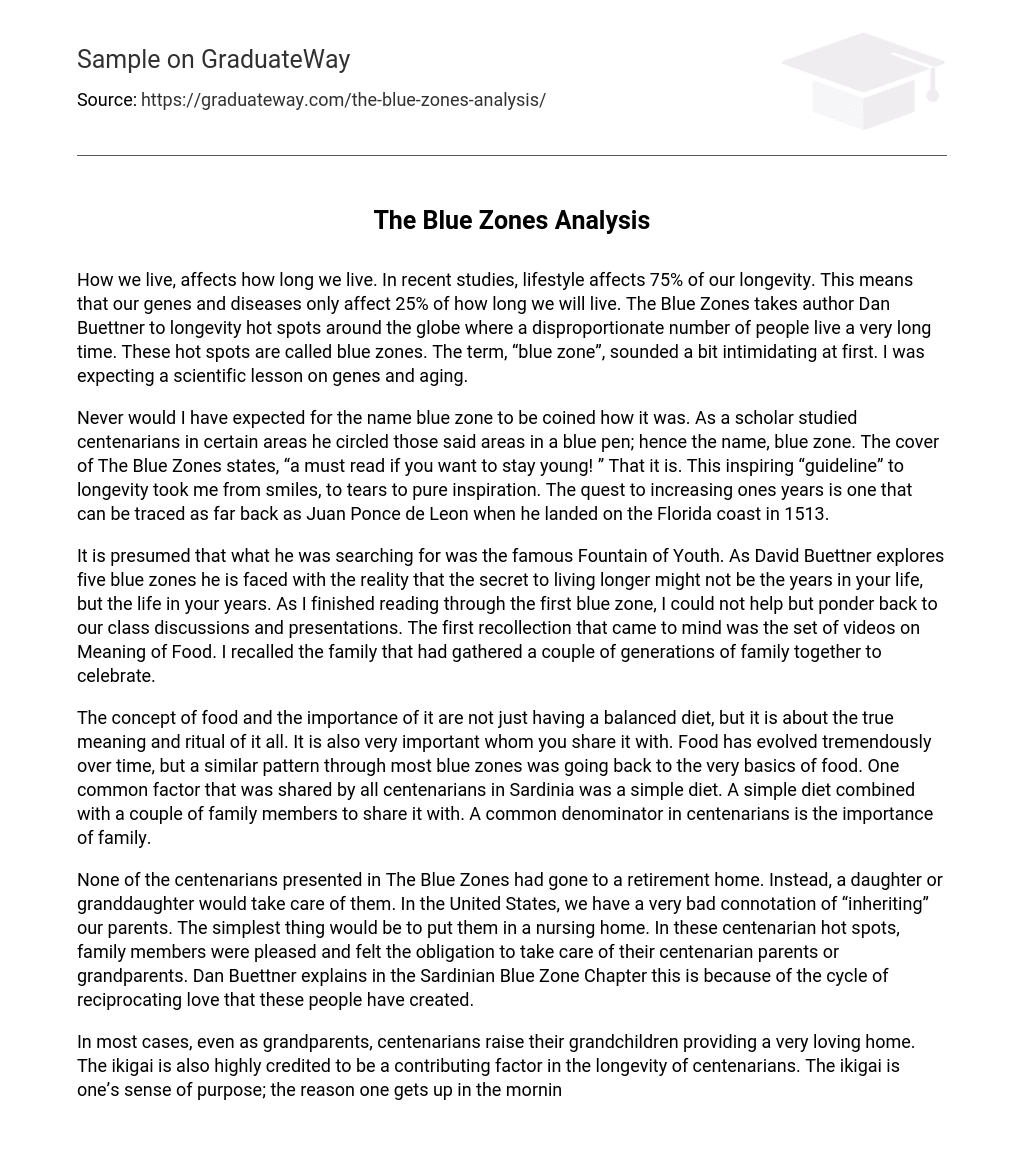How we live, affects how long we live. In recent studies, lifestyle affects 75% of our longevity. This means that our genes and diseases only affect 25% of how long we will live. The Blue Zones takes author Dan Buettner to longevity hot spots around the globe where a disproportionate number of people live a very long time. These hot spots are called blue zones. The term, “blue zone”, sounded a bit intimidating at first. I was expecting a scientific lesson on genes and aging.
Never would I have expected for the name blue zone to be coined how it was. As a scholar studied centenarians in certain areas he circled those said areas in a blue pen; hence the name, blue zone. The cover of The Blue Zones states, “a must read if you want to stay young! ” That it is. This inspiring “guideline” to longevity took me from smiles, to tears to pure inspiration. The quest to increasing ones years is one that can be traced as far back as Juan Ponce de Leon when he landed on the Florida coast in 1513.
It is presumed that what he was searching for was the famous Fountain of Youth. As David Buettner explores five blue zones he is faced with the reality that the secret to living longer might not be the years in your life, but the life in your years. As I finished reading through the first blue zone, I could not help but ponder back to our class discussions and presentations. The first recollection that came to mind was the set of videos on Meaning of Food. I recalled the family that had gathered a couple of generations of family together to celebrate.
The concept of food and the importance of it are not just having a balanced diet, but it is about the true meaning and ritual of it all. It is also very important whom you share it with. Food has evolved tremendously over time, but a similar pattern through most blue zones was going back to the very basics of food. One common factor that was shared by all centenarians in Sardinia was a simple diet. A simple diet combined with a couple of family members to share it with. A common denominator in centenarians is the importance of family.
None of the centenarians presented in The Blue Zones had gone to a retirement home. Instead, a daughter or granddaughter would take care of them. In the United States, we have a very bad connotation of “inheriting” our parents. The simplest thing would be to put them in a nursing home. In these centenarian hot spots, family members were pleased and felt the obligation to take care of their centenarian parents or grandparents. Dan Buettner explains in the Sardinian Blue Zone Chapter this is because of the cycle of reciprocating love that these people have created.
In most cases, even as grandparents, centenarians raise their grandchildren providing a very loving home. The ikigai is also highly credited to be a contributing factor in the longevity of centenarians. The ikigai is one’s sense of purpose; the reason one gets up in the morning to embrace the day. The ikigai is also strongly associated with embracing the “now. ” In the United States, we commonly see preteens, teenagers and even young adult struggling with the purpose of their lives. This can be highly associated with our fast-paced lifestyle.
We get caught up in senseless things, and take the small things for granted. In the long run, it is these small things that are characteristics to centenarian success. Another example that made me recall class was our lecture and discussion on the paradox of food. Mid-January we discussed the evolution of food and how as a society we grew impatient at perfecting and facilitating this need for food. We first started with agriculture, and then made machines to do all of the work for us. The paradox is it all started with a good intention of having these need met in an easier way.
As the 21st century arrives we realize that this is not healthy and want to go back to our ways of “all natural. ” It is truly amazing how theses centenarian hotspots have managed to be the exception to this worldwide rule. Although machines have replaced a long hours or work and labor, vehicles have replaced the long walk to work, junk and processed food can replace the long hours of cooking and cleaning and finally, television and iPods have replaced long family talks as entertainment centenarians have managed to escape modern life’s accommodations.
The amazing part is that this decision is completely willful. Upon registering for this section of Contemporary World Issues, I expected to maybe be turned vegan or vegetarian. I thought I would listen to stories about McDonald’s and their processed food or Wendy’s and the thumb that was found their chili, but more than anything I learned something much more important. That is the quality of changing your lifestyle and the lifestyle of your eating habits to live a better life. Food is just one factor to the equation. It is the memories that are shared with the people that you share them that are important.





